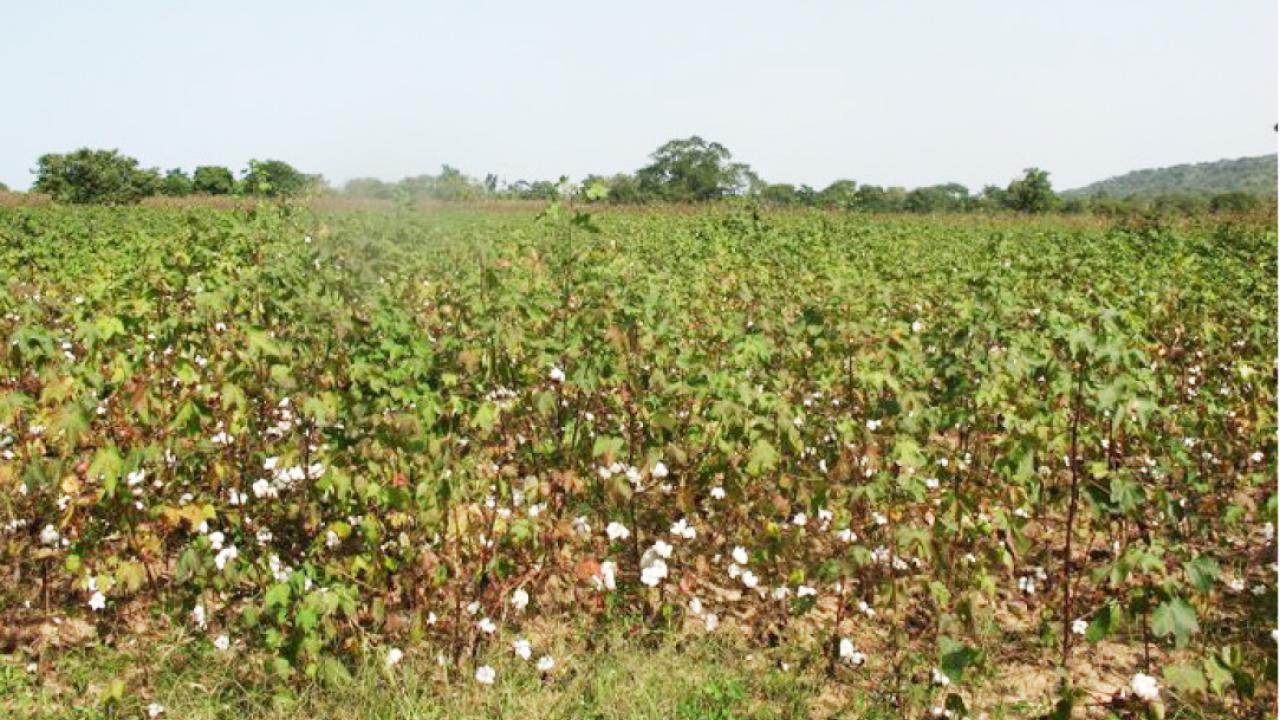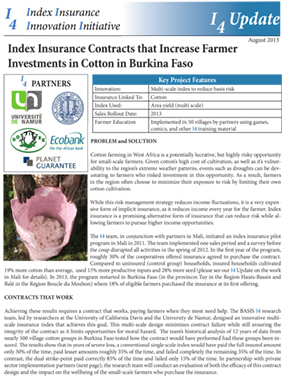
Cotton farming in West Africa is a potentially lucrative, but highly risky opportunity for small-scale farmers. Given cotton’s high cost of cultivation, as well as it’s vulnerability to the region’s extreme weather patterns, events such as droughts can be devastating to farmers who risked investment in this opportunity. As a result, farmers in the region often choose to minimize their exposure to risk by limiting their own cotton cultivation.
Key Project Features
Innovation: Multi-scale index to reduce basis risk insurance
Linked to: Cotton Index Used: Area yield (multi scale)
Sales Rollout Date: 2013
Farmer Education: Implemented in 50 villages by partners using games, comics, and other I4 training material
 While this risk management strategy reduces income fluctuations, it is a very expensive form of implicit insurance, as it reduces income every year for the farmer. Index insurance is a promising alternative form of insurance that can reduce risk while allowing farmers to pursue higher income opportunities.
While this risk management strategy reduces income fluctuations, it is a very expensive form of implicit insurance, as it reduces income every year for the farmer. Index insurance is a promising alternative form of insurance that can reduce risk while allowing farmers to pursue higher income opportunities.
The I4 team, in conjunction with partners in Mali, initiated an index insurance pilot program in Mali in 2011. The team implemented one sales period and a survey before the coup disrupted all activities in the spring of 2012. In the first year of the program, roughly 30% of the cooperatives offered insurance agreed to purchase the contract. Compared to uninsured (control group) households, insured households cultivated 19% more cotton than average, used 15% more productive inputs and 28% more seed (please see our I4 Update on the work in Mali for details). In 2013, the program restarted in Burkina Faso (in the provinces Tuy in the Region Hauts-Bassin and Balé in the Région Boucle du Mouhon) where 18% of eligible farmers purchased the insurance at its first offering.
Contracts that Work
Achieving these results requires a contract that works, paying farmers when they most need help. The BASIS I4 research team, led by researchers at the University of California Davis and the University de Namur, designed an innovative multiscale insurance index that achieves this goal. This multi-scale design minimizes contract failure while still ensuring the integrity of the contract as it limits opportunities for moral hazard.
The team’s historical analysis of 12 years of data from nearly 500 village cotton groups in Burkina Faso tested how the contract would have performed had these groups been insured. The results show that in years of severe loss, a conventional single scale index would have paid the full insured amount only 30% of the time, paid lesser amounts roughly 35% of the time, and failed completely the remaining 35% of the time.
In contrast, the dual strike-point paid correctly 85% of the time and failed only 15% of the time. In partnership with private sector implementation partners (next page), the research team will conduct an evaluation of both the efficacy of this contract design and the impact on the wellbeing of the small-scale farmers who purchase the insurance.
Private Sector Partnerships
After research activities in Mali were halted due to the 2012 coup d’etat, the BASIS I4 research team and its partner Planet Guarantee were approached by a private sector financial service provider in Burkina Faso interested in having the work begun in Mali continue in their country.
In making this approach, Ecobank, the largest provider of cotton finance in Burkina Faso, and Sofitex, the largest cotton value chain firm in the country, were both convinced that the cotton sector could perform better in Burkina Faso. A reliable insurance contract could be key to unlocking the productive potential of the Burkinabè farmer. These initial conversations have resulted in a robust partnership with close collaboration between Ecobank, Sofitex, Planet Guarantee and I4.
Key Lessons
Impact: The results from the first sales period in Mali indicated that those farmers who purchased the insurance were more likely to expand their cotton cultivation, increase use of productive inputs and increase the use of seeds.
Uptake: The I4 team and implementation partners in Burkina Faso have implemented the first sales of index insurance in that country. In this first sales period, in the cooperatives where the product was advertised 18.4 percent bought the insurance. This covered 446 farmers, 2,331 hectares, insured a total value of 233,100,100 CFA, and collected 26,107,200 CFA in premiums.
Innovation: The I4 team designed contracts with very low failure rates to increase the efficacy of the contracts in protecting farmers against risk.
Challenges: Insurance pricing in weak data environments remains a problem. Researchers continue to work with the insurance industry to make contracts available to as many farmers as possible at reasonable prices.
Next Steps: The I4 team and implementation partners will work to increase the availability of the index insurance contracts and to improve the pricing. Researchers will continue to monitor impacts.
This report is made possible by the generous support of the American people through the United States Agency for International Development (USAID). The contents are the responsibility of the Feed the Future Innovation Lab for Assets and Market Access at UC Davis and do not necessarily reflect the views of USAID or the United States Government.
